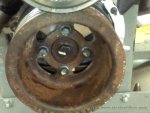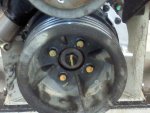JAsher45
New member
- 192
- 1
- 0
- Location
- Redfield, Iowa
this past week at work i was running some very powerful 6.5s on the dyno ... 5 in a row 190+hp and could not figure out why they were running so good. i got to looking closer and noticed that the pulleys were different on the water pump and crank... the were Aluminum alloy not steel.
i went to the production shop to check it out... they were coming off the tear down motors and they were light... wow light crank pully was close to 6 pounds lighter and the water pump pully was close to 4 pounds lighter.
So if you want to free up about 10-15 hp and 20-25 ft/lbs of torque keep your eyes pealed for these pulleys.. yes they are for HMMWV's but the only real thing you would have to change is the power streering pully since there is no step down like on our pullys
i went to the production shop to check it out... they were coming off the tear down motors and they were light... wow light crank pully was close to 6 pounds lighter and the water pump pully was close to 4 pounds lighter.
So if you want to free up about 10-15 hp and 20-25 ft/lbs of torque keep your eyes pealed for these pulleys.. yes they are for HMMWV's but the only real thing you would have to change is the power streering pully since there is no step down like on our pullys
Attachments
-
65.8 KB Views: 223
-
71.7 KB Views: 223





